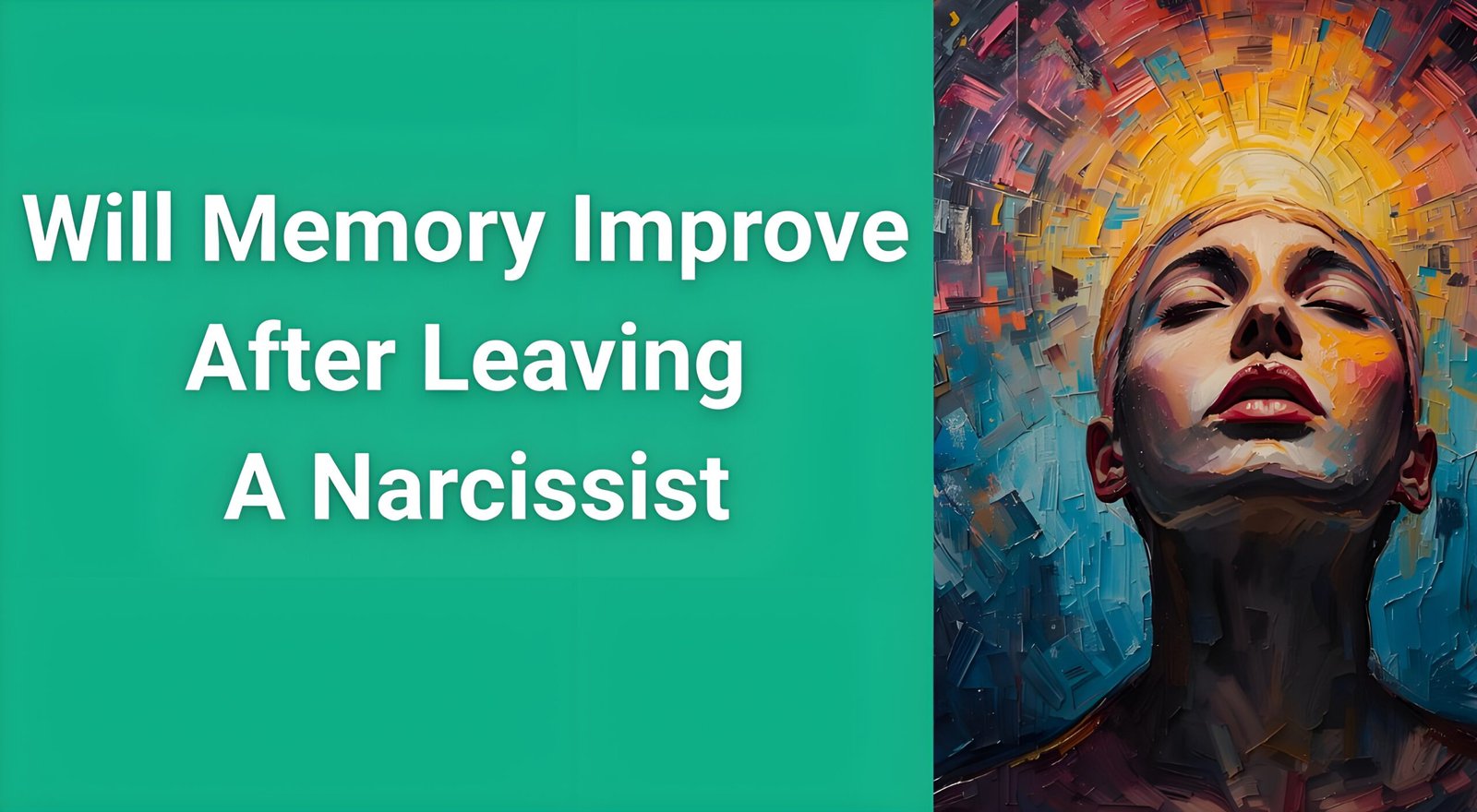If you’re asking “will memory improve after leaving a narcissist,” you’re likely experiencing the cognitive fog that haunts survivors of narcissistic abuse. The constant second-guessing, forgotten conversations, and that unsettling feeling that your mind isn’t working the way it used to—these aren’t signs of weakness or permanent damage. They’re the predictable result of prolonged psychological trauma, and yes, your memory can and will improve after leaving a narcissist.
- The Science Behind Memory Loss in Narcissistic Abuse
- What Memory Recovery Looks Like: The Timeline
- Factors That Influence Memory Recovery Speed
- Proven Strategies to Accelerate Memory Recovery
- Breaking Free from Trauma Bonds: The Memory Connection
- Red Flags: When Memory Problems Persist
- The Role of Self-Compassion in Memory Recovery
- Creating New, Healthy Memory Patterns
- The Intersection of Memory and Identity Recovery
- Frequently Asked Questions
- Conclusion: Your Memory Can and Will Heal
The confusion you’re feeling right now is real, valid, and shared by thousands of survivors who’ve walked this path before you. Understanding why your memory has been affected and what recovery looks like can provide the clarity you desperately need to move forward.
The Science Behind Memory Loss in Narcissistic Abuse
When you’re trapped in a narcissistic relationship, your brain operates in a constant state of hypervigilance. The unpredictable cycles of love-bombing, devaluation, and discard create a neurological storm that fundamentally alters how your memory functions.
How Narcissistic Abuse Damages Memory
The human brain processes and stores memories through two key regions: the hippocampus (responsible for memory formation and retrieval) and the amygdala (which processes emotions and triggers fight-or-flight responses). Chronic stress from narcissistic abuse creates elevated cortisol levels that literally shrink the hippocampus while enlarging the amygdala.
This neurological imbalance explains why you might remember every painful detail of an argument but struggle to recall positive moments or basic daily information. Your brain has been rewired to prioritize survival over normal cognitive function.
The Gaslighting Effect on Memory
Narcissists deliberately distort reality through gaslighting—denying events that occurred, claiming you said things you didn’t, or insisting their version of events is correct when you know it’s false. This constant reality-checking exhausts your cognitive resources and creates what researchers call “betrayal trauma.”
Your brain begins to doubt its own perceptions, leading to:
- Difficulty trusting your memory of events
- Second-guessing conversations and interactions
- Feeling confused about what actually happened
- Memory gaps around traumatic incidents
- Brain fog and difficulty concentrating
What Memory Recovery Looks Like: The Timeline
Understanding that will memory improve after leaving a narcissist requires knowing what the healing process actually entails. Recovery isn’t linear, but there are predictable patterns that most survivors experience.
Phase 1: Initial Withdrawal (0-3 Months)
The first few months after leaving a narcissist can feel like cognitive chaos. You might experience:
Memory Symptoms:
- Intense brain fog
- Difficulty making decisions
- Trouble following conversations
- Forgetfulness about daily tasks
- Obsessive thoughts about the relationship
What’s Happening: Your brain is detoxing from the constant stress chemicals. The hippocampus begins to recognize it’s no longer under immediate threat, but the healing process takes time.
Recovery Signs: You might notice small improvements in sleep quality and moments of mental clarity, even if they’re brief.
Phase 2: Neurological Stabilization (3-6 Months)
As your nervous system begins to regulate, memory function starts showing improvement:
Memory Improvements:
- Reduced brain fog episodes
- Better ability to focus on tasks
- Clearer recall of recent events
- Less confusion in conversations
- Improved decision-making capacity
What’s Happening: Cortisol levels normalize, allowing the hippocampus to begin healing. New neural pathways form as your brain adapts to a safer environment.
Recovery Signs: You can read books again, follow movie plots, and remember appointments more consistently.
Phase 3: Cognitive Reconstruction (6-12 Months)
This phase marks significant improvements in overall cognitive function:
Memory Improvements:
- Trustworthy short-term memory
- Clearer recollection of past events
- Ability to distinguish between reality and manipulation
- Improved working memory
- Better emotional regulation affecting memory formation
What’s Happening: The hippocampus continues healing, and new neural connections strengthen. Your brain develops better discrimination between real and false memories implanted through gaslighting.
Phase 4: Full Recovery and Beyond (12+ Months)
While individual timelines vary, most survivors see substantial memory improvement by the one-year mark:
Long-term Recovery:
- Normal cognitive function returns
- Ability to form new, healthy memories
- Clear distinction between past trauma and present reality
- Improved learning and retention abilities
- Resilience against future manipulation
Factors That Influence Memory Recovery Speed
Several variables affect how quickly your memory will improve after leaving a narcissist:
Duration and Intensity of Abuse
Longer exposure to narcissistic abuse typically requires more time for complete recovery. However, even survivors of decades-long relationships report significant improvement within the first two years of no contact.
Type of Narcissistic Abuse Experienced
Different abuse patterns affect memory differently:
- Covert narcissistic abuse often causes more memory distortion due to subtle gaslighting
- Overt narcissistic abuse may cause trauma-based memory gaps
- Childhood narcissistic abuse requires specialized healing approaches
Support System and Resources
Survivors with strong support networks and access to trauma-informed therapy typically see faster memory recovery. Professional help accelerates healing by providing tools to process traumatic memories safely.
Implementation of No Contact
Maintaining strict no contact allows your brain to heal without continued trauma. Even minimal contact can slow memory recovery by reactivating stress responses.
Proven Strategies to Accelerate Memory Recovery
While time is the primary healer, specific strategies can speed up the process:
Neuroplasticity-Based Recovery Techniques
Mindfulness and Meditation: Regular meditation practice helps rebuild the prefrontal cortex and strengthens neural pathways associated with clear thinking. Even 10 minutes daily can show measurable improvement in cognitive function within weeks.
Journaling for Memory Reconstruction: Writing about your experiences helps organize fragmented memories and distinguish between actual events and gaslighting-induced confusion. This practice literally rewires your brain’s ability to process and store information accurately.
Cognitive Behavioral Exercises: Working with trauma-informed therapists who understand narcissistic abuse can provide targeted exercises to rebuild trust in your own perceptions and memories.
Physical Strategies for Brain Recovery
Exercise and Movement: Physical activity increases BDNF (brain-derived neurotrophic factor), which promotes neuroplasticity and hippocampus healing. Regular exercise accelerates memory recovery significantly.
Sleep Optimization: Quality sleep is crucial for memory consolidation. Survivors often struggle with sleep, but improving sleep hygiene can dramatically speed recovery.
Nutrition for Brain Health: Certain nutrients support neuroplasticity and memory function. Omega-3 fatty acids, antioxidants, and B vitamins can support your brain’s healing process.
Breaking Free from Trauma Bonds: The Memory Connection
One significant obstacle to memory recovery is the neurological addiction created by trauma bonding. Your brain becomes literally addicted to the intermittent reinforcement pattern typical of narcissistic relationships.
This biochemical addiction affects memory by:
- Creating obsessive thoughts that interfere with new memory formation
- Causing you to ruminate on relationship memories instead of forming new ones
- Maintaining stress hormone levels that impede healing
- Keeping you psychologically tied to your abuser
Understanding trauma bonding as a neurological phenomenon—not a character flaw—is crucial for memory recovery. Many survivors find that specialized resources designed to break trauma bonds accelerate overall healing, including memory function.
Red Flags: When Memory Problems Persist
While most survivors see significant improvement in memory function, certain warning signs indicate you might need additional support:
Concerning Symptoms Beyond 12 Months:
- Severe memory gaps affecting daily function
- Inability to form new memories consistently
- Persistent dissociation episodes
- Continued confusion about basic facts
- Intrusive traumatic memories interfering with present-moment awareness
Professional Support Options
Trauma-Informed Therapy: Therapists specializing in narcissistic abuse understand the unique memory challenges survivors face. EMDR, somatic therapy, and specialized trauma treatments can be particularly effective.
Neurological Assessment: If memory problems persist significantly, ruling out other medical causes ensures you’re addressing the right issues.
Support Groups: Connecting with other survivors validates your experience and provides practical strategies from people who understand your journey.
The Role of Self-Compassion in Memory Recovery
One often-overlooked aspect of memory improvement after leaving a narcissist is the role of self-compassion. Years of criticism and blame can create internal voices that interfere with healing.
Developing Memory Self-Trust
Learning to trust your memory again requires:
- Accepting that your memories are valid even when doubted
- Recognizing gaslighting patterns from your past relationship
- Practicing self-validation instead of seeking external confirmation
- Building confidence in your perceptions gradually
Managing Memory-Related Anxiety
Many survivors develop anxiety around their memory function, which ironically impedes recovery. Techniques for managing this include:
- Reality grounding exercises to stay present
- Memory journaling to track improvement over time
- Relaxation techniques to reduce memory-related stress
- Celebrating small wins in cognitive recovery
Creating New, Healthy Memory Patterns
As your brain heals from narcissistic abuse, you have an opportunity to establish healthier memory and cognitive patterns:
Protective Cognitive Strategies
Future-Proofing Your Memory: Developing skills to recognize manipulation helps protect against future memory distortion. This includes trusting your initial impressions and documenting important conversations.
Building Positive Memory Banks: Intentionally creating positive experiences and memories helps balance the trauma-heavy memories from your abusive relationship.
Strengthening Reality-Testing: Regular check-ins with trusted friends or therapists helps maintain accurate perception and memory formation going forward.
The Intersection of Memory and Identity Recovery
Memory recovery after narcissistic abuse isn’t just about cognitive function—it’s about reclaiming your identity. Narcissistic abuse fragments not just memory but sense of self.
Rebuilding Identity Through Memory Work
Recovering Pre-Abuse Memories: Many survivors rediscover aspects of themselves they’d forgotten. As memory clears, personality traits, interests, and values that were suppressed often resurface.
Integration of Traumatic Memories: Healthy memory recovery includes integrating traumatic experiences without being defined by them. This process allows you to acknowledge what happened while moving forward.
Creating Future-Focused Memories: As cognitive function improves, you can begin intentionally creating the life and memories you want, rather than just surviving.
Frequently Asked Questions
How long does it take for memory to improve after leaving a narcissist?
Most survivors notice initial improvements within 3-6 months, with significant recovery occurring within 12-18 months. However, individual timelines vary based on factors like abuse duration, support systems, and implementation of healthy recovery strategies.
Can narcissistic abuse cause permanent memory damage?
While narcissistic abuse causes real neurological changes, the brain’s neuroplasticity allows for remarkable recovery. Most memory problems are reversible with time and proper support, though the healing process requires patience and often professional guidance.
Why do I remember some things clearly but not others after narcissistic abuse?
Trauma affects different types of memory differently. You might have vivid recall of emotional or threatening events while struggling with everyday memory formation. This is a normal trauma response and typically improves as your nervous system heals.
Will no contact improve my memory faster?
Yes, maintaining no contact allows your brain to heal without continued trauma activation. Even minimal contact with your narcissistic abuser can slow memory recovery by reactivating stress responses and maintaining trauma bonding.
Should I try to remember everything that happened in my narcissistic relationship?
While some memory recovery happens naturally, forcing yourself to remember every detail isn’t necessary or healthy. Focus on healing and moving forward rather than perfect recall of traumatic events.
How can I tell if my memories of the abuse are accurate?
Trust your emotional responses to memories and patterns of behavior rather than focusing on perfect factual recall. Gaslighting creates confusion about details, but your emotional truth about the relationship’s impact is valid.
Conclusion: Your Memory Can and Will Heal
The question “will memory improve after leaving a narcissist” has a resounding answer: yes. Your brain possesses remarkable healing abilities, and the cognitive fog, memory gaps, and confusion you’re experiencing are not permanent conditions.
Recovery requires time, patience, and often professional support, but thousands of survivors have reclaimed their cognitive clarity and mental freedom. Your memory problems are evidence of trauma, not personal failure, and healing is not only possible but probable.
The journey from cognitive confusion to mental clarity mirrors your overall recovery from narcissistic abuse. As your memory heals, you’ll likely find your confidence, decision-making abilities, and sense of self healing alongside it.
Remember that seeking support accelerates recovery. Whether through trauma-informed therapy, survivor communities, or specialized resources designed for narcissistic abuse recovery, you don’t have to heal alone. Your memory—and your life—can be reclaimed.
Your cognitive freedom is worth fighting for, and every day away from narcissistic abuse is a day your brain grows stronger, clearer, and more trustworthy. The fog will lift, and when it does, you’ll have both the memory function and wisdom to build the life you deserve.






